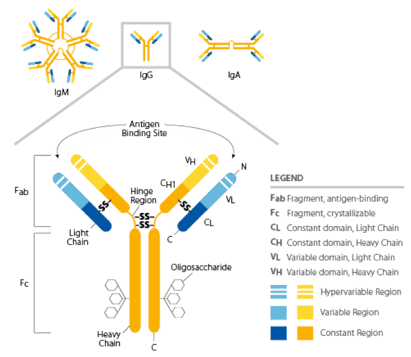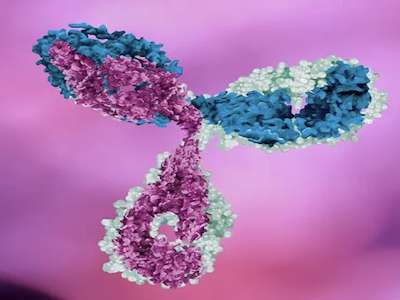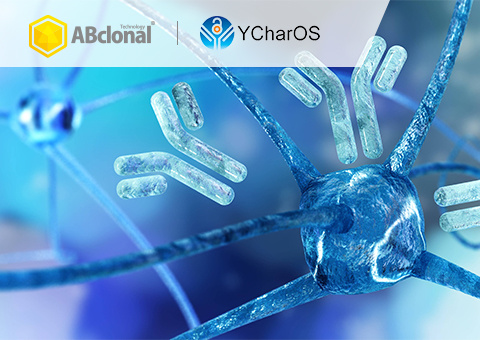ABclonal has developed over 12,000 high quality antibody products since its inception in 2011. With this significant and time-tested experience, you can rest assured that ABclonal is relentless in its focus on the production and development of quality antibodies. Let’s further our understanding of antibodies by taking a more in-depth look at their structure, function, and uses in research.
Antibodies: A Primer
An antibody (also known as an immunoglobulin) is a protective protein produced by the immune system in response to the presence of an antigen. It is a Y-shaped molecule composed of two heavy chains and two light chains, which are held together by disulfide bonds. Each tip of its Y-shaped structure contains a paratope that can specifically bind with an epitope on a corresponding antigen.

Figure 1. Structure of an antibody molecule.
Monoclonal and polyclonal are the two main types of antibodies. Monoclonal antibodies (mAbs) recognize a single antigen and bind with a single epitope, while polyclonal antibodies (pAbs) recognize a single antigen but bind with multiple different epitopes. The processes of producing mAbs and pAbs are different, and both provide significant support for research and diagnostic purposes. The procedures followed for harvesting each type of antibody are outlined below:
|
Procedure for harvesting monoclonal antibodies (mAbs): |
|
1. Inject antigen into animals and prepare myeloma cells |
|
2. Isolate spleen cells from the animals and collect myeloma cells |
|
3. Fuse the myeloma cells and splenocytes to form hybrid cells |
|
4. Separate hybrid cells and allow them to proliferate into clones |
|
5. Screen and pick desired monoclonal antibody |
|
6. Scale up production |
|
Procedure for harvesting polyclonal antibodies (pAbs): |
|
1. Inject antigen into animals |
|
2. Antigen activates B cells |
|
3. Plasma B cells produce antibodies |
|
4. Collect antiserum containing antibodies |
|
5. Purify antigen-specific polyclonal antibodies |
Applications in Research
The antibodies can be then used in a multitude of applications, including but not limited to: western blot (WB), immunoprecipitation (IP), immunofluorescence (IF), immunohistochemistry (IHC), chromatin immunoprecipitation (ChIP), and flow cytometry (FC). As a cornerstone of the body’s immune response, antibodies can provide significant data to support scientists’ research.
Let’s take a closer look at Western blotting (WB) to help further our understanding of antibodies. WB is an important and widely used technique in biological experiments. Using this method, researchers are able to identify specific proteins in a sample of tissue homogenate or extract. Antibodies are an essential ingredient to run a WB assay, and the choice of antibodies used can greatly affect final results. This method requires the use of both primary and secondary antibodies. The primary antibody recognizes and binds to the specific epitopes on the target protein. Usually, the primary antibody and the target protein are not directly detectable. The secondary antibodies are conjugated with fluorescent or radioactive labels, which are detectable after applying subsequent chemiluminescent reagents. The choice of secondary antibody depends on the host species of the primary antibody selected. The secondary antibodies bind to the heavy chains of primary antibodies, so as to not interfere with the primary antibody’s binding to the target protein.
It is important to note that not all primary antibodies are suitable for all applications. It is therefore necessary to double check that your desired application is included in the application list. If you are having trouble finding the antibody that specifically recognizes your target protein, or if you want antibodies with higher specificity and sensitivity, ABclonal offers a full custom antibody service that is available for all types of antibody production. Get in touch with us using the contact information listed below or drop a line on our contact page to learn more about our extensive catalog of antibody products and custom services.
Additionally, if you're curious about the different types of antibodies available on the market, check out some of our other antibody-related blogs that we've curated here.



.png)

